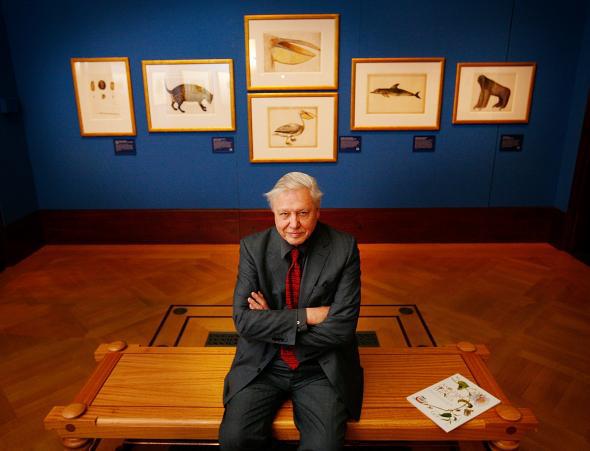If Barack Obama wants you to fly across the Atlantic to talk about nature for a half-hour, then you do it.
But Obama probably doesn’t want you to do that. He wanted legendary nature documentarian and environmental advocate Sir David Attenborough. According to the Telegraph, Attenborough was flown to the White House from his London home last month for a 30-minute meeting with the president. Apparently the president is a big nature buff—though the meeting seems like it was a bit odd. Attenborough revealed the meeting at a public event in London on Tuesday.
From the Telegraph:
Sir David said his audience with the President took place in the Blue Room of the White House and saw the two men discuss climate change, conservation and Mr Obama’s “feeling for nature”.
Even upon leaving Washington, though, Attenborough admits he was “baffled” as to why Obama called for the meeting in the first place, other than just to chat. “He wanted to make it clear that he was not a philistine in this matter [of the environment]. He is on the side of the natural world and that’s what he wanted to be clear,” the documentarian said. Attenborough also got the sense from his meeting that Obama may want to dedicate his post-presidency years to environmental issues.
Perhaps this is Obama’s strange way of responding to ongoing criticism of his administration’s conflicting, half-hearted policies on the Arctic and on climate change in general: “It’s OK: Because, look! I’m friends with David Attenborough!”
Attenborough’s most famous work is his Life series, which spanned from 1979 to 2005. He also headlined Planet Earth, the first-ever high definition nature documentary, in 2006. A 2012 BBC America rundown lists Attenborough as Britain’s No. 1 “internationally unsung national treasure,” “a man who deserves to be a household name all over the world.” The site offers a near-perfect description of Sir David:
To British television viewers he is the kind uncle with a passion for the natural world and the infinite patience to show you everything. His serene, whispered tones (very similar to those of his elder brother Richard in Jurassic Park, just a lot less pretend-Scottish) being akin to the greatest teacher you ever had, speaking about their most passionately-loved topic, for as long as you want.
He’s had a dozen or so species named in his honor, including the Attenborosaurus, a long-necked aquatic dinosaur that lived in Europe 195 million years ago. His signature superlatives have inspired an eponymous drinking game. (The best drinking game … “on the planet.”) Slate science editor Laura Helmuth calls his viral rendition of “(What a) Wonderful World” “pretty much the best music video of ever.”
In his decades of traveling the world to appear in wildlife documentaries, he’s had his share of (intentionally) close run-ins with animals, often to comedic effect.
In recent years, he’s become a vocal advocate for environmental causes, including the global shift to noncarbon forms of energy. Attenborough, who joined the BBC in 1952, is an optimist, eschewing the “doom and gloom” that environmental campaigns sometimes fall victim to. That attitude fits nicely with bold goals of the Global Apollo Programme, an initiative begun by a group of prominent U.K. scientists and policy experts—the latest in a shift away from “people are bad” environmentalism. It calls for countries to spend 0.02 percent of their GDP on research aimed at making carbon-free electricity cheaper than coal within 10 years—a nod to President Kennedy’s ambitious moonshot speech in 1961.
The U.S. budget for research and development into renewable energy has long been criticized by energy experts as being too low. Obama’s 2016 budget proposes a big increase—just not big enough. He’d need at least another $1 billion or so to meet the Global Apollo Programme’s requirement. If he wants to show off his environmental chops, maybe the president should start there.
Update, July 1, 2015: Attenborough’s meeting with Obama was produced by BBC into a sort of fête for Attenborough’s career, with the president doing the interviewing. The full video is now online:
Though it’s unclear in the video exactly how Attenborough managed to wind up at the White House on his 89th birthday, a BBC producer has confirmed to Slate that the White House did not fund Attenborough’s trans-Atlantic flight, and the legendary naturalist “was already in Washington for another event.”
